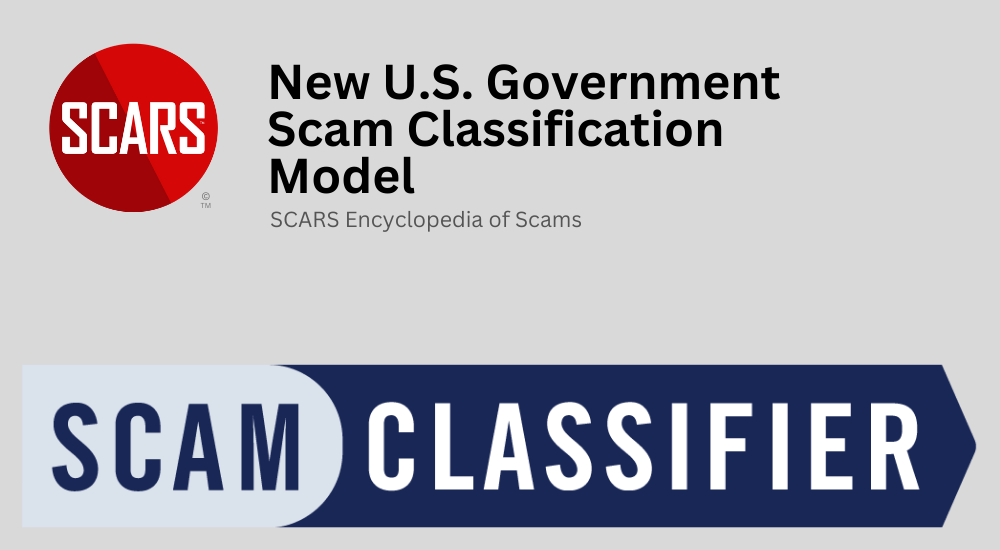
SCARS Institute’s Encyclopedia of Scams™ Published Continuously for 25 Years

 Stopping Online Fraud Is Everyone’s Responsibility!
Stopping Online Fraud Is Everyone’s Responsibility!
If You Allow The Scammers To Get Away With It, You Are Helping Them Win!
It is all of our responsibility to report frauds, and expose scammers. Only in this way can we help stop this online scourge.

You Can Report Fraud Easily Here:

Fraudulent activities should always be reported to your local law enforcement office. It does not need to be a major thing, just go down to your local police and file a report. Yes it will take an hour of your time, but the more reports there are, the more authorities nationally and internationally will respond.
The following is additional information on how specific types of fraud complaints or cases of suspected fraud can be submitted to federal agencies.
What Do You Want To Report:
- Computer-Based Fraud
- Cyber Crime
- Elder Fraud or Financial Exploitation
- Identity Theft
- Mail Fraud
- Mass Marketing/Telemarketing Fraud
- Mortgage Fraud or Loan Scams
The Internet Crime Complaint Center (www.IC3.gov) is the primary government agency to receive, develop, and refer complaints regarding the rapidly expanding area of cyber crime. The IC3 complaint process provides victims of cyber crimes a convenient, easily accessible, online reporting mechanism to alert law enforcement of suspected criminal and civil violations. For law enforcement and regulatory agencies at the federal, state, local and international levels, IC3 is the central clearinghouse for complaints on internet related crimes.
See the “File a Complaint” section of the IC3 Web Site for information and direction on how to submit a complaint to IC3. IC3 handles complaints on the following types of frauds and scams:
-
Auction Fraud/Auction Fraud – Romania
Auction fraud involves fraud attributable to the misrepresentation of a product advertised for sale through an Internet auction site or the non-delivery of products purchased through an Internet auction site
-
Counterfeit Cashier’s Check Frauds
The counterfeit cashier’s check scheme targets individuals that use Internet classified advertisements to sell merchandise. Typically, an interested party located outside the United States contacts a seller, and the seller is told that the buyer has an associate in the United States that owes him money. As such, the buyer will have the associate send the seller a cashier’s check for the amount owed to the buyer, but the check is actually counterfeit.
-
Credit Card Fraud
Credit card fraud is the unauthorized use of a credit/debit card, or card number, to fraudulently obtain money or property.
-
Debt Elimination Frauds
Debt elimination schemes generally involve websites advertising a legal way to dispose of mortgage loans and credit card debts. After obtaining information from the participant, the fraudster will issues bonds and promissory notes to the lenders that purport to legally satisfy the debts of the participant. In exchange, the participant is then required to pay a certain percentage of the value of the satisfied debts to the subject.
-
Parcel Courier Email Scheme
The Parcel Courier Email Scheme involves the supposed use of various National and International level parcel providers such as DHL, UPS, FedEx and the USPS.
-
Employment/Business Opportunities
Employment/business opportunity schemes involve bogus foreign-based companies that recruit citizens in the United States on several employment-search websites for work-at-home employment opportunities. These positions often involve reselling or reshipping merchandise to destinations outside the United States.
-
Escrow Services Fraud
In an effort to persuade a wary Internet auction participant, the perpetrator will propose the use of a third-party escrow service to facilitate the exchange of money and merchandise. The victim is unaware the perpetrator has compromised a true escrow site and, in actuality, created one that closely resembles a legitimate escrow service. The victim sends payment to the phony escrow and receives nothing in return. Or, the victim sends merchandise to the subject and waits for his/her payment through the escrow site which is never received because it is not a legitimate service.
-
Identity Theft & Online Impersonation *
Identity theft occurs when someone appropriates another’s personal information in order to commit theft or fraud.
-
Internet Extortion & Fraud
Internet Extortion involves hacking into and controlling various industry databases, promising to release control back to the company if funds are received, or the subjects are given web administrator jobs. Similarly, the subject will threaten to compromise information about consumers in the industry database unless funds are received.
-
Online Investment Fraud
Investment fraud is an offer using false or fraudulent claims to solicit investments or loans, or providing for the purchase, use, or trade of forged or counterfeit securities.
-
Online & Spam Lotteries Fraud
The lottery scheme deals with persons randomly contacting email addresses advising them they have been selected as the winner of an International lottery.
-
Nigerian Letter or “419“
Named for the violation of Section 419 of the Nigerian Criminal Code, the 419 scam involves communication from individuals representing themselves as Nigerian or foreign government officials, offering the recipient the “opportunity” to share in a percentage of millions of dollars, and soliciting for help in placing large sums of money in overseas bank accounts. Payment of taxes, bribes to government officials, and legal fees are often described in great detail with the promise that all expenses will be reimbursed as soon as the funds are out of the country. The recipient is encouraged to send information to the author, such as blank letterhead stationery, bank name and account numbers, and other identifying information using a facsimile number provided in the letter. The scheme relies on convincing a willing victim to send money to the author of the letter in several installments of increasing amounts for a variety of reasons.
-
Email & Online Phishing/Spoofing Frauds
Phishing and spoofing refer to forged or faked electronic documents. Spoofing generally refers to the dissemination of email which is forged to appear as though it was sent by someone other than the actual source. Phishing, often utilized in conjunction with a spoofed email, is the act of sending an email falsely claiming to be an established legitimate business in an attempt to dupe the unsuspecting recipient into divulging personal, sensitive information such as passwords, credit card numbers, and bank account information after directing the user to visit a specified website. The website, however, is not genuine and was set up only as an attempt to steal the user’s information.
-
Ponzi/Pyramid Scheme Fraud
Ponzi or pyramid schemes are investment scams in which investors are promised abnormally high profits on their investments. No investment is actually made. Early investors are paid returns with the investment money received from the later investors. The system usually collapses. The later investors do not receive dividends and lose their initial investment.
-
Reshipping Fraud
The “reshipping” scheme requires individuals in the United States to receive packages at their residence and subsequently repackage the merchandise for shipment, usually abroad. The reshipping scheme helps facilitate the transfer of goods purchased online by fraudulent means.
-
Spam Emails & Email Fraud
With improved technology and world-wide Internet access, spam, or unsolicited bulk email, is now a widely used medium for committing traditional white collar crimes including financial institution fraud, credit card fraud, and identity theft, among others.
-
Third Party Receiver of Funds Fraud
The subjects, usually foreign, post work-at-home job offers on popular Internet employment sites, soliciting assistance from United States citizens. The subjects allegedly are posting Internet auctions, but cannot receive the proceeds from these auctions directly because their locations outside the United States makes receiving these funds difficult. The seller asks the United States citizen to act as a third party receiver of funds from victims who have purchased products from the subject via the Internet. The United States citizen, receiving the funds from the victims, then wires the money to the subject.
* RomanceScamsNow is a part of The Campaign To End Online Impersonation™
We are helping to build an organization that will support global efforts to reduce and end impersonation in online social media and online dating websites around the world.

-/ 30 /-
What do you think about this?
Please share your thoughts in a comment below!
Table of Contents
LEAVE A COMMENT?
Thank you for your comment. You may receive an email to follow up. We never share your data with marketers.
Recent Comments
On Other Articles
- on Love Bombing And How Romance Scam Victims Are Forced To Feel: “I was love bombed to the point that I would do just about anything for the scammer(s). I was told…” Feb 11, 14:24
- on Dani Daniels (Kira Lee Orsag): Another Scammer’s Favorite: “You provide a valuable service! I wish more people knew about it!” Feb 10, 15:05
- on Danielle Delaunay/Danielle Genevieve – Stolen Identity/Stolen Photos – Impersonation Victim UPDATED 2024: “We highly recommend that you simply turn away form the scam and scammers, and focus on the development of a…” Feb 4, 19:47
- on The Art Of Deception: The Fundamental Principals Of Successful Deceptions – 2024: “I experienced many of the deceptive tactics that romance scammers use. I was told various stories of hardship and why…” Feb 4, 15:27
- on Danielle Delaunay/Danielle Genevieve – Stolen Identity/Stolen Photos – Impersonation Victim UPDATED 2024: “Yes, I’m in that exact situation also. “Danielle” has seriously scammed me for 3 years now. “She” (he) doesn’t know…” Feb 4, 14:58
- on An Essay on Justice and Money Recovery – 2026: “you are so right I accidentally clicked on online justice I signed an agreement for 12k upfront but cd only…” Feb 3, 08:16
- on The SCARS Institute Top 50 Celebrity Impersonation Scams – 2025: “Quora has had visits from scammers pretending to be Keanu Reeves and Paul McCartney in 2025 and 2026.” Jan 27, 17:45
- on Scam Victims Should Limit Their Exposure To Scam News & Scammer Photos: “I used to look at scammers photos all the time; however, I don’t feel the need to do it anymore.…” Jan 26, 23:19
- on After A Scam, No One Can Tell You How You Will React: “This article was very informative, my scams happened 5 years ago; however, l do remember several of those emotions and/or…” Jan 23, 17:17
- on Situational Awareness and How Trauma Makes Scam Victims Less Safe – 2024: “I need to be more observant and I am practicing situational awareness. I’m saving this article to remind me of…” Jan 21, 22:55
ARTICLE META
Important Information for New Scam Victims
- Please visit www.ScamVictimsSupport.org – a SCARS Website for New Scam Victims & Sextortion Victims
- Enroll in FREE SCARS Scam Survivor’s School now at www.SCARSeducation.org
- Please visit www.ScamPsychology.org – to more fully understand the psychological concepts involved in scams and scam victim recovery
If you are looking for local trauma counselors please visit counseling.AgainstScams.org or join SCARS for our counseling/therapy benefit: membership.AgainstScams.org
If you need to speak with someone now, you can dial 988 or find phone numbers for crisis hotlines all around the world here: www.opencounseling.com/suicide-hotlines
A Note About Labeling!
We often use the term ‘scam victim’ in our articles, but this is a convenience to help those searching for information in search engines like Google. It is just a convenience and has no deeper meaning. If you have come through such an experience, YOU are a Survivor! It was not your fault. You are not alone! Axios!
A Question of Trust
At the SCARS Institute, we invite you to do your own research on the topics we speak about and publish, Our team investigates the subject being discussed, especially when it comes to understanding the scam victims-survivors experience. You can do Google searches but in many cases, you will have to wade through scientific papers and studies. However, remember that biases and perspectives matter and influence the outcome. Regardless, we encourage you to explore these topics as thoroughly as you can for your own awareness.
Statement About Victim Blaming
SCARS Institute articles examine different aspects of the scam victim experience, as well as those who may have been secondary victims. This work focuses on understanding victimization through the science of victimology, including common psychological and behavioral responses. The purpose is to help victims and survivors understand why these crimes occurred, reduce shame and self-blame, strengthen recovery programs and victim opportunities, and lower the risk of future victimization.
At times, these discussions may sound uncomfortable, overwhelming, or may be mistaken for blame. They are not. Scam victims are never blamed. Our goal is to explain the mechanisms of deception and the human responses that scammers exploit, and the processes that occur after the scam ends, so victims can better understand what happened to them and why it felt convincing at the time, and what the path looks like going forward.
Articles that address the psychology, neurology, physiology, and other characteristics of scams and the victim experience recognize that all people share cognitive and emotional traits that can be manipulated under the right conditions. These characteristics are not flaws. They are normal human functions that criminals deliberately exploit. Victims typically have little awareness of these mechanisms while a scam is unfolding and a very limited ability to control them. Awareness often comes only after the harm has occurred.
By explaining these processes, these articles help victims make sense of their experiences, understand common post-scam reactions, and identify ways to protect themselves moving forward. This knowledge supports recovery by replacing confusion and self-blame with clarity, context, and self-compassion.
Additional educational material on these topics is available at ScamPsychology.org – ScamsNOW.com and other SCARS Institute websites.
Psychology Disclaimer:
All articles about psychology and the human brain on this website are for information & education only
The information provided in this article is intended for educational and self-help purposes only and should not be construed as a substitute for professional therapy or counseling.
While any self-help techniques outlined herein may be beneficial for scam victims seeking to recover from their experience and move towards recovery, it is important to consult with a qualified mental health professional before initiating any course of action. Each individual’s experience and needs are unique, and what works for one person may not be suitable for another.
Additionally, any approach may not be appropriate for individuals with certain pre-existing mental health conditions or trauma histories. It is advisable to seek guidance from a licensed therapist or counselor who can provide personalized support, guidance, and treatment tailored to your specific needs.
If you are experiencing significant distress or emotional difficulties related to a scam or other traumatic event, please consult your doctor or mental health provider for appropriate care and support.
Also read our SCARS Institute Statement about Professional Care for Scam Victims – click here to go to our ScamsNOW.com website.








![SCARS™ Special Report: Help Wanted Scams [Updated] job scams SCARS™ Special Report: Help Wanted Scams [Updated] job scams](https://romancescamsnow.com/wp-content/uploads/2020/03/job-scams.png)







I chatted with a USA soldier from dating site, he said that he is now on duty in Egypt and applied for a leave.
The Army will pay for the air ticket to USA but he need to pay USD1000 first and USD500 more for the replacement for soldier when he is on leave, he paid USD1000 but don’t have USD500 to pay before he can go back home, he asked me to help to pay for USD500, I think it is a scam , pls advise, many thanks
It is a scam